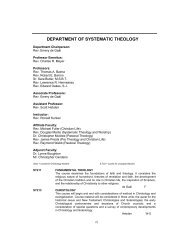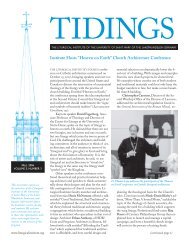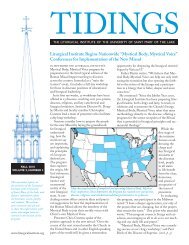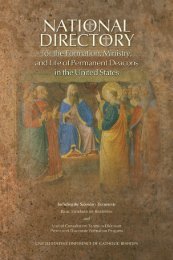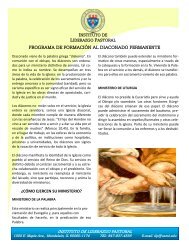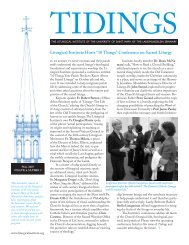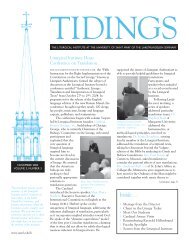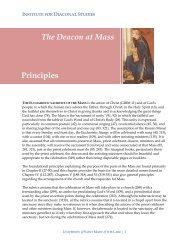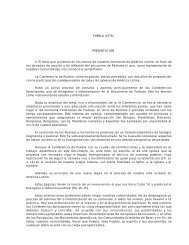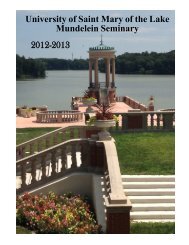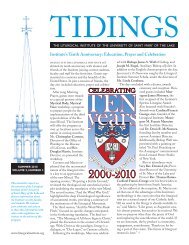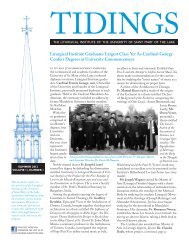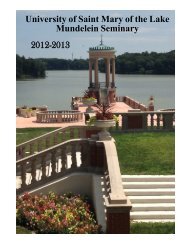Volume Five, Number 2, Summer 2006 - Mundelein Seminary
Volume Five, Number 2, Summer 2006 - Mundelein Seminary
Volume Five, Number 2, Summer 2006 - Mundelein Seminary
You also want an ePaper? Increase the reach of your titles
YUMPU automatically turns print PDFs into web optimized ePapers that Google loves.
TIDINGS<br />
THE LITURGICAL INSTITUTE OF THE UNIVERSITY OF SAINT MARY OF THE LAKE/MUNDELEIN SEMINARY<br />
Institute <strong>Summer</strong> Session Sees Largest Enrollment To Date<br />
SUMMER <strong>2006</strong><br />
VOLUME 5, NUMBER 2<br />
This newsletter reports on<br />
the activities of the Liturgical<br />
Institute of the University<br />
of Saint Mary of the Lake/<br />
<strong>Mundelein</strong> <strong>Seminary</strong>, and<br />
features information about<br />
the Institute’s events, faculty,<br />
and students. We welcome<br />
your comments and ask you<br />
to share this information with<br />
others who might have an<br />
interest in the mission of this<br />
program.<br />
www.liturgicalinstitute.org<br />
THE LITURGICAL INSTITUTE’S FOURTH SUMMER<br />
session marked a high point for the program,<br />
with 32 students enrolled in the summer’s course<br />
offerings. Students came from 10 states and 4<br />
countries, from as far away as Singapore and as<br />
close by as our own town of <strong>Mundelein</strong>, Illinois.<br />
Students and faculty included the entire spectrum<br />
of the Church: single and married lay<br />
women and men, male and female religious, a<br />
permanent deacon, and diocesan seminarians<br />
and clergy. Students came from many walks of<br />
life: recent college graduates, diocesan worship<br />
office directors, elementary and high school theology<br />
teachers, seminary professors and those<br />
training for a second career.<br />
The summer sessions<br />
were enlivened by the Institute’s<br />
excellent visiting faculty,<br />
carefully chosen for the<br />
intensive summer sessions,<br />
and the faculty also displayed<br />
the breadth of the Church’s<br />
legitimate diversity: a lay<br />
man, a lay woman, a permanent<br />
deacon, and a priest.<br />
Rev. Mr. Owen Cummings,<br />
Regents’ Professor of Theology<br />
at Mount Angel <strong>Seminary</strong><br />
and author of numerous<br />
books and articles, came from<br />
Oregon with his daughter to<br />
spend three weeks teaching<br />
about the Liturgical Year and<br />
the Liturgy of the Hours.<br />
Rev. Eugene Morris, Assistant<br />
Professor of Sacramental<br />
Theology and Director of Worship at Kenrick-<br />
Glennon <strong>Seminary</strong> in St. Louis, shared his expertise<br />
in the area of Matrimony and Holy Orders.<br />
Dr. Lynne Boughton, one of the Institute’s<br />
adjunct faculty members, offered a course on<br />
Liturgy and Cultural Adaptation. Lastly, Mr.<br />
Christopher Carstens, Director of the Sacred<br />
Worship Office in the Diocese of LaCrosse used<br />
his years of expertise in front-line liturgical education<br />
to teach a course entitled “Liturgical Preparation<br />
and Training.”<br />
As usual, the joyful energy and enthusiasm<br />
of the summer session participants flowed over<br />
into other activities, including the sung Morning<br />
and Evening Prayer. Daily chanted masses were<br />
led by our summer choirmaster, Rev. Samuel<br />
Weber, OSB, who not only taught and led the<br />
sung prayer, but also composed most of the tones<br />
himself. <strong>Summer</strong> student Sr. Rosemary Esseff,<br />
OP, who already holds a degree in Sacred Music,<br />
directed a schola which sang polyphonic music.<br />
The educational and liturgical life of the summer<br />
The summer <strong>2006</strong> “family photo” of students and faculty. This summer’s enrollment<br />
was the Institute’s highest ever, and students represented all facets of the Church’s<br />
life: single and married lay people, permanent deacons, male and female religious,<br />
seminarians and diocesan clergy.<br />
was supplemented with field trips, celebrations<br />
of the Solemnity of Saints Peter and Paul, and<br />
special meals, providing a thoroughly and genuinely<br />
Catholic experience for all who participated<br />
in its offerings.<br />
Please look inside for more information and<br />
consider joining us for the summer of 2007.
From the Director<br />
Fr. Douglas Martis, a priest of<br />
the Diocese of Joliet, holds an<br />
S.T.D. with a concentration in<br />
Sacramental Theology from the<br />
Institut Catholique de Paris<br />
and a Ph.D. in History of<br />
Religions and Religious<br />
Anthropology from the<br />
Sorbonne.<br />
THE CHURCH IN THE UNITED STATES will soon<br />
have a new opportunity, embarking on a massive<br />
endeavor of liturgical formation and catechesis.<br />
With the approval of the English language<br />
translation of the Ordo Missæ by the USCCB in<br />
June, the bishops have paved the way for renewed<br />
commitment to opening the beauty of<br />
the Eucharistic Liturgy for the Catholic faithful.<br />
This fresh translation offers texts for the Mass<br />
that are deeply spiritual, rich in symbolism and<br />
biblical imagery and theologically precise. These<br />
benefits manifest important liturgical values and<br />
will help the prayer of the English-speaking<br />
world to both express and form the faith of<br />
Catholic people.<br />
The new translation coincides with a<br />
broader effort aimed at raising the dignity of liturgical<br />
expression so that the manner of praying<br />
is worthy of the great Mystery celebrated. This<br />
trend can be seen in the publication of ritual<br />
books, where greater emphasis is placed on the<br />
elegance of the typesetting and quality of the<br />
binding. It can be perceived in the design, renovation<br />
and construction of church buildings that<br />
allow greater access to the sacramental nature of<br />
the structure and manifest appreciation for the<br />
hierarchical nature of the liturgy. It can even be<br />
heard in the work of church musicians who are<br />
committed to sacred music which is theologically<br />
accurate and artistically worthy.<br />
We must reclaim one of the earliest values<br />
of the twentieth century liturgical movement:<br />
that the continuing renewal not be the domain<br />
of an elite squad of liturgical celebrities, but<br />
truly be an apostolate that promotes the prayer<br />
of the Body of Christ. This is why, as we look<br />
forward to the next decade of liturgical renewal,<br />
it will be important that qualified pastors and<br />
teachers provide the faithful with the necessary<br />
tools, foundation and insight to receive, implement<br />
and embrace the Third Edition of the Roman<br />
Missal.<br />
It will be important to explain not only<br />
what this text means, but also how to pray it.<br />
The time of preparation for the future teachers<br />
of the liturgy has arrived! With a deep love for<br />
the Church, theological training and liturgical<br />
formation, they will be able to effectively and<br />
faithfully give the People of God access to genuinely<br />
enter into the celebration of the Mass.<br />
May God give us the necessary grace and wisdom<br />
in the years to come so that our prayer together<br />
on earth will bring us to an eternity of<br />
praise with all the angels and saints. <br />
UPCOMING EVENTS AT THE LITURGICAL INSTITUTE<br />
October 25-27, <strong>2006</strong> Heaven on Earth: Building or Renovating Your Catholic Church<br />
A theological and practical conference on how to envision the church building as a sacrament of heaven. Includes sessions on<br />
thinking of architecture sacramentally, choosing a good traditional architect, finding craftspeople, acoustics and music, the nature<br />
of the image, fund-raising, and a beginning-to-end walk through of a church project. Speakers include David Fagerberg, Ethan<br />
Anthony, Christopher Carstens, Jeff Greene, Rev. Mark Daniel Kirby, Rev. Thomas Loya, Denis McNamara, Rita Perrett and<br />
William Buckingham.<br />
November 1, <strong>2006</strong>, 7:30 P.M. Women and Priestly Ordination<br />
A Hillenbrand Lecture with Sr. Sara Butler, MSBT, faculty member in theology at Saint Joseph <strong>Seminary</strong> in New York and<br />
member of the International Theological Commission. Once an advocate of women’s ordination, she has since promoted the<br />
Church’s official teaching, and will soon be releasing The Catholic Priesthood and Women: A Guide to the Teaching of the Church with<br />
Hillenbrand Books.<br />
November 10, <strong>2006</strong> Preaching Advent and Christmas<br />
A one-day workshop for priests and deacons on preaching for the Advent and Christmas seasons with popular speaker and<br />
prolific author Deacon Owen Cummings, Regents Professor of Theology at Mount Angel <strong>Seminary</strong> in Oregon.<br />
For more information call 847.837.4542 or visit www.liturgicalinstitute.org
Fr. Jordan Kelly Guides Institute’s First Music Retreat<br />
Fr. Jordan Kelly, OP offers his thoughts on music for the<br />
Liturgical Institute’s first Sacred Music Retreat.<br />
as part of its CONTINUING MISSION to bring the<br />
renewal of the liturgy to the entire Church, the<br />
Liturgical Institute sponsored a five day retreat<br />
for church musicians between June 25 and June<br />
30th, <strong>2006</strong>. Rather than a conference busy with<br />
practical sessions, this<br />
event was a preached retreat<br />
led by Dominican<br />
Father Jordan Kelly of<br />
Oak Park, Illinois, himself<br />
an accomplished organist<br />
and choir director. Each<br />
day included sung morning,<br />
midday and evening<br />
prayer, Mass, spiritual<br />
talks on the theology of<br />
music, spiritual direction,<br />
and ample time for quiet<br />
prayer and recollection.<br />
In his opening talk,<br />
“A Clean Heart Create<br />
For Me O God,” Kelly<br />
laid out his plans for the<br />
retreat. A musician with<br />
significant pastoral experience<br />
himself, Kelly established<br />
a rapport with the<br />
retreatants. While understanding<br />
their working conditions, he urged<br />
them to avoid seeing themselves as a professional<br />
musicians first and participants in the liturgy<br />
second. As a remedy Kelly encouraged disciplined<br />
personal prayer as well as continual development<br />
of musical skills.<br />
In the session entitled “The Songs We Sing,<br />
The Texts We Live,” Kelly analyzed the words of<br />
the Our Father in order to explain how liturgical<br />
musicians take lectio divina to their daily work in<br />
their own parishes. Claiming that our home is in<br />
heaven, he proposed that musical prayer is properly<br />
considered a conversation with God about<br />
God.<br />
In the talk entitled “No More Beige Music,<br />
Please!,” Kelly asked participants to look at the<br />
lyrics of some recent church music, analyzing the<br />
primary emphases of texts and how those texts<br />
were reinforced by rhythm and melody. Claiming<br />
that liturgical music texts need to engage both<br />
proper theology and singable melodies which<br />
reinforces the content of texts, Kelly invited careful<br />
reflection on the nature of liturgical music.<br />
Sitting behind a piano keyboard, Kelly played<br />
the same songs with different meter and arrangements<br />
to help people assess their effect on<br />
prayerfulness.<br />
Participant comments included appreciation<br />
of the retreat’s combination of sung prayer, quiet<br />
time, and educational sessions. “I appreciated the<br />
hands-on experience with chanted prayer and the<br />
thoughtful, expertise of both presenters and<br />
participants,”one retreatant wrote. Please consider<br />
attending our June 2007 Sacred Music Retreat. <br />
Msgr. Kevin Irwin Speaks on the Liturgy<br />
on june 21 <strong>2006</strong>, the liturgical institute summer session students and faculty welcomed Monsignor Kevin Irwin, noted<br />
sacramental theologian and Dean of the School of Theology at the Catholic University of America. The author of 15 books and<br />
over 50 scholarly articles, Irwin spoke as one of the Liturgical Institute’s Hillenbrand Distinguished Lecturers. Irwin’s talk addressed<br />
three issues: a summary of the pathways of liturgical theology experienced<br />
in his own academic life, his thoughts on the new liturgical translations recently<br />
generated by the International Commission on English in the Liturgy, and the<br />
possibility of sacramentality in the American consumer culture.<br />
Irwin said that his own career in liturgical theology began with the lex orandilex<br />
credendi model of liturgy, which meant the study of texts, a method which “respected<br />
the evolution of rites over 2000 years.” Later, he said, he began to study<br />
“critical liturgical theology,” investigating how adjustments can be made so that the<br />
liturgy can be enhanced. Next, Irwin said, is an approach to liturgy which attends<br />
to the sacramentality of the liturgy and in particular the primalness of “fire, earth,<br />
water, wine and bread” as well as the cosmic dimensions of the liturgy.<br />
Irwin then spoke of his recent work with liturgical translations, emphasizing<br />
the need to develop texts rich with theological meaning while remaining “aware of<br />
the dangers of fundamentalism.” Lastly, he commented on Vincent Miller’s recent<br />
book Consuming Religion, which underscored modern society’s lack of connection<br />
between the work of production and the sacraments. “Food from nowhere and<br />
clothes made by no one” was the phrase Irwin chose to stimulate discussion about<br />
the human work of making bread, wine, vessels and vestments before ritual begins.<br />
Monsignor Kevin Irwin with Liturgical Institute<br />
alumna Sr. Marganne Drago.
Meet Our<br />
Students<br />
More student profiles to come<br />
in future issues<br />
Ms. Kambra Cappelle, B.A.,<br />
Marquette University, Secondary<br />
Education and Religious<br />
Studies. Kambra is on the faculty<br />
at Carmel High School in<br />
<strong>Mundelein</strong>, Illinois, where she<br />
teaches courses in Catholic<br />
doctrine, Hebrew scriptures<br />
and Sacraments. She was attracted<br />
by the Liturgical Institute’s “solid reputation,”<br />
and has already learned “material to use in my classroom<br />
and with my colleagues.” She hopes to use her<br />
knowledge to “educate the youth about the importance<br />
and irreplaceablility of the liturgy,” translating<br />
her education “to the next generation of Catholic<br />
leaders.”<br />
Fr. James Wall, B.A, History,<br />
Arizona State University, M.<br />
Div., St. John’s <strong>Seminary</strong>,<br />
Camarillo. Fr. James is a<br />
priest of the Diocese of<br />
Phoenix, Arizona, and pastor<br />
of St. Thomas the Apostle<br />
parish in that city. He chose<br />
the Liturgical Institute because<br />
it offers a “balanced program while also being<br />
flexible enough given the demands of being a<br />
pastor.” He hopes to assist his bishop with liturgical<br />
issues at the diocesan and pastoral levels, and<br />
help implement a liturgical commission in the<br />
Diocese of Phoenix.<br />
Fr. Gerald Carey, B. Music ,<br />
Westminster Choir College,<br />
M.Div., St. Charles Borromeo<br />
<strong>Seminary</strong>, Overbrook. Fr.<br />
Gerald is a priest of the Archdiocese<br />
of Philadelphia, where<br />
he currently Director of the<br />
Archdiocesan Office For Worship.<br />
He has served as parochial<br />
vicar in the Philadelphia area as well as in<br />
Nuestra Senora del Carmen parish in Puerto Rico.<br />
He expects that the knowledge gained at the Institute<br />
will help him in his current position, and appreciated<br />
the true “noble simplicity of the Institute’s<br />
liturgical celebrations.”<br />
Sr. Ave Maria Hayes, B.S.,<br />
Nursing, Franciscan University<br />
of Steubenville, Certificate in<br />
Education, Eastern Michigan<br />
University. Sr. Ave Maria is a<br />
member of the Dominican Sisters<br />
of Mary, Mother of the<br />
Eucharist in Ann Arbor,<br />
Michigan, where she has served<br />
as a liturgy and music planner. She is currently a<br />
teacher at St. Francis-by-the-Sea School in Hilton<br />
Head, South Carolina. She particularly appreciated<br />
the Institute’s “classes and the caliber of its students,<br />
making class discussions really outstanding.”<br />
Ms. Stephanie Jaeckel B.M.,<br />
Music, Illinois Wesleyan University.<br />
A musician and recent<br />
college graduate, Stephanie is a<br />
native of <strong>Mundelein</strong>, Illinois.<br />
She serves assistant choir director<br />
in her home parish and<br />
as organist for two local parishes.<br />
She also runs a piano<br />
studio with twenty students. She came to the Liturgical<br />
Institute because of its “dedication to practicing<br />
what it preaches through beautiful liturgies. She<br />
hopes to pass on her liturgical knowledge to “other<br />
lay women and youth so that they may better understand<br />
our beautiful Catholic faith.”<br />
Fr. Eric Nielsen, B.S. Civil<br />
and Environmental Engineering,<br />
University of Wisconsin-<br />
Madison, M. Div and S.T.B.,<br />
University of Saint Mary of<br />
the Lake/<strong>Mundelein</strong> <strong>Seminary</strong>.<br />
A priest of the Diocese of<br />
Madison, Wisconsin, Fr. Eric<br />
is pastor of St. Mary of<br />
Palmyra and St. Mary Help of Christians Church in<br />
Sullivan, Wisconsin. He came to the Institute in order<br />
to learn how to “help people see liturgy as the<br />
most effective means by which we give God worship<br />
and recieve his grace.”<br />
Would you like to be<br />
among the leaders of<br />
the “new era in<br />
liturgical renewal”?<br />
Write for further information:<br />
The Liturgical Institute<br />
University of Saint Mary<br />
of the Lake/<strong>Mundelein</strong> <strong>Seminary</strong><br />
1000 East Maple Avenue<br />
<strong>Mundelein</strong>, Illinois 60060<br />
847.837.4542<br />
or see our web site at:<br />
www.liturgicalinstitute.org<br />
Multiple Awards for Heavenly City<br />
the liturgical institute announces that Heavenly City: The Architectural Tradition of Catholic<br />
Chicago, a special project of the Institute, was the winner of the Benjamin Franklin Award given by<br />
the Independent Book Publishers Association in the category “religion.”<br />
The book was also honored by the Midwest Book Awards with a first<br />
place finish in the categories of “history” and “regional non-fiction,” with<br />
an honorable mention for interior layout. Authored by Institute faculty<br />
member Denis McNamara and edited by Kevin Thornton, head of the<br />
Institute’s Hillenbrand Books imprint, Heavenly City showcases 68 of<br />
Chicago’s Catholic churches with high-quality color photography by<br />
James Morris, and scholarly yet accessible historical text. For ordering<br />
information see www.ltp.org. <br />
“Heavenly City is so beautifully illustrated that I can imagine using it as a<br />
source of prayer — as many Catholics pray with icons today.”<br />
George Weigel, author and historian
Archbishop Coleridge and Monsignor Bruce Harbert<br />
Discuss Liturgical Translations at Hillenbrand Lecture<br />
Archbishop Mark Coleridge, Archbishop of Canberra,<br />
Australia and Monsignor Bruce Harbert, Executive<br />
Secretary of the International Commission on English in<br />
the Liturgy, answer questions from Liturgical Institute<br />
students and faculty.<br />
AS PART OF THE HILLENBRAND DISTINGUISHED<br />
Lecture Series, the Liturgical Institute welcomed<br />
Most Reverend Mark Coleridge, Archbishop of<br />
Canberra, Australia and Chair of the Roman<br />
Missal Editorial Committee<br />
and Monsignor Bruce<br />
Harbert, Executive Secretary<br />
of the International<br />
Commission on English in<br />
the Liturgy. The Liturgical<br />
Institute asked the pair to<br />
discuss the theological and<br />
sacramental implications of<br />
the new liturgical translations<br />
currently underway,<br />
and discuss the challenges<br />
facing translators today.<br />
Harbert spoke first,<br />
explaining that a fundamental<br />
goal of the commission is<br />
to make liturgical language<br />
accessible, to “tune the<br />
channel by which the Missal<br />
is made available to the<br />
People of God.” His goal is<br />
to “form a language which<br />
will give the richness of the<br />
Missal texts.”<br />
Part of the process of making translation<br />
choices, Harbert said, is choosing the right<br />
“register.” Register, he said, “is the subset of the<br />
language that is appropriate for a particular<br />
context. If you go to Buckingham palace, knock<br />
on the door and say ‘Hi, Queen,’ you’d have the<br />
register wrong. What we have to try and find is<br />
an acceptable register which will nonetheless be<br />
faithful to the Missal.”<br />
Certain words, like “oblation,” “supplication,”<br />
and “ineffable,” Harbert said, have caused<br />
particular problems in translation, since many<br />
claim that these words are no longer current to<br />
modern speech. Many of these words, he said,<br />
are often very difficult to replace, and “every<br />
time somebody says these words can’t be<br />
used...the stock of [words] gets smaller and<br />
smaller and the job gets more and more difficult.”<br />
Harbert spoke of the word “awesome,” an<br />
archaic word which is centuries old, “but which<br />
has had a revival, and is handy word for a<br />
concept that is quite common in the Missal. It’s<br />
a tightrope between the formal and the colloquial.”<br />
“Some passages are very difficult to translate,”<br />
Harbert said, yet they often make very<br />
specific comments about the concept of God.<br />
Certain words have overtones which stretch<br />
back to the Reformation and even earlier, yet<br />
“our job is to translate the Missal faithfully.”<br />
Harbert then handed out several translations of<br />
the same prayer, asking the audience to consider<br />
the theological implications of each text. His<br />
goal in the talk, he said, was to give “a taste of<br />
the process” of translation and to prepare people<br />
for the forthcoming release of the new Missal. <br />
Institute Visits Pipe Organ Builder<br />
as part of its mission to unite the academic, pastoral and<br />
artistic dimensions of liturgy, the Liturgical Institute sponsored a<br />
visit to the Bellwood, Illinois factory of Berghaus Organs, founded<br />
in 1967 by Leonard Berghaus. Dave McCleary, who offered the tour<br />
of the planning, construction and tuning areas of his facility, said<br />
that despite competition from electronic organs, pipe organs are<br />
making a comeback. In a thorough tour, students were introduced to<br />
some beginning theory on the nature of organ pipes, how their size,<br />
shape and materials determine the sound each pipe makes.<br />
McCleary then showed some of Berghaus’ recent projects, discussing<br />
church size, resonance and the design of casework. The group then<br />
walked through the organ production facility to see the restoration<br />
and fabrication of organ consoles and wind chests, including a 40-<br />
foot tall room which allows for full-scale assembly of organs before<br />
they are brought to their final location. Lastly, the fine art of pipe<br />
voicing was demonstrated. The Liturgical Institute offers its thanks<br />
to Berghaus Organs for its hospitality, and for preparing our students<br />
with practical knowledge for their future ministries.<br />
Dave McCleary of Berghaus Organs shows Institute students and<br />
faculty how pipe organs are designed and constructed.
Scenes from the Liturgical Institute<br />
(left to right): Institute Director Fr. Douglas Martis leads an orientation session; Benediction during opening night Solemn Vespers in the Chapel of the<br />
Immaculate Conception; Fr. Eugene Morris teaches a course on Marriage and Holy Orders.<br />
(left to right): Liturgical Institute music director Linda Cerabona teaches Institute students the real meaning of Italian cooking; Institute student Fr.<br />
James Kurzynski breaks out his telescope to study the cosmic liturgy; Liturgical Institute students and faculty share meals and ideas in the refectory.<br />
TIDINGS<br />
UNIVERSITY OF SAINT MARY OF THE LAKE<br />
THE LITURGICAL INSTITUTE<br />
1000 East Maple Avenue<br />
<strong>Mundelein</strong>, Illinois 60060<br />
www.liturgicalinstitute.org<br />
Nonprofit Organization<br />
U.S. POSTAGE PAID<br />
MUNDELEIN, IL<br />
PERMIT NO. 103



